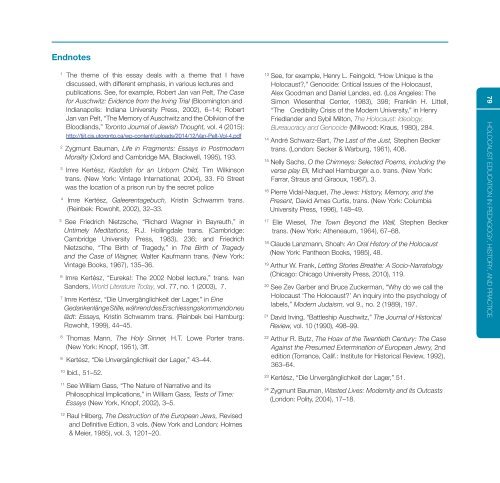2kNreeJ
2kNreeJ
2kNreeJ
You also want an ePaper? Increase the reach of your titles
YUMPU automatically turns print PDFs into web optimized ePapers that Google loves.
Endnotes<br />
1<br />
The theme of this essay deals with a theme that I have<br />
discussed, with different emphasis, in various lectures and<br />
publications. See, for example, Robert Jan van Pelt, The Case<br />
for Auschwitz: Evidence from the Irving Trial (Bloomington and<br />
Indianapolis: Indiana University Press, 2002), 6–14; Robert<br />
Jan van Pelt, “The Memory of Auschwitz and the Oblivion of the<br />
Bloodlands,” Toronto Journal of Jewish Thought, vol. 4 (2015):<br />
http://tjjt.cjs.utoronto.ca/wp-content/uploads/2014/12/Van-Pelt-Vol-4.pdf<br />
2<br />
Zygmunt Bauman, Life in Fragments: Essays in Postmodern<br />
Morality (Oxford and Cambridge MA, Blackwell, 1995), 193.<br />
3<br />
Imre Kertész, Kaddish for an Unborn Child, Tim Wilkinson<br />
trans. (New York: Vintage International, 2004), 33. Fö Street<br />
was the location of a prison run by the secret police<br />
4<br />
Imre Kertész, Galeerentagebuch, Kristin Schwamm trans.<br />
(Reinbek: Rowohlt, 2002), 32–33.<br />
5<br />
See Friedrich Nietzsche, “Richard Wagner in Bayreuth,” in<br />
Untimely Meditations, R.J. Hollingdale trans. (Cambridge:<br />
Cambridge University Press, 1983), 236; and Friedrich<br />
Nietzsche, “The Birth of Tragedy,” in The Birth of Tragedy<br />
and the Case of Wagner, Walter Kaufmann trans. (New York:<br />
Vintage Books, 1967), 135–36.<br />
6<br />
Imre Kertész, “Eureka!: The 2002 Nobel lecture,” trans. Ivan<br />
Sanders, World Literature Today, vol. 77, no. 1 (2003), 7.<br />
7<br />
Imre Kertész, “Die Unvergänglichkeit der Lager,” in Eine<br />
Gedankenlänge Stille, während des Erschiessngskommando neu<br />
lädt: Essays, Kristin Schwamm trans. (Reinbek bei Hamburg:<br />
Rowohlt, 1999), 44–45.<br />
8<br />
Thomas Mann, The Holy Sinner, H.T. Lowe Porter trans.<br />
(New York: Knopf, 1951), 3ff.<br />
9<br />
Kertész, “Die Unvergänglichkeit der Lager,” 43–44.<br />
10<br />
Ibid., 51–52.<br />
11<br />
See William Gass, “The Nature of Narrative and its<br />
Philosophical Implications,” in William Gass, Tests of Time:<br />
Essays (New York, Knopf, 2002), 3–5.<br />
12<br />
Raul Hilberg, The Destruction of the European Jews, Revised<br />
and Definitive Edtion, 3 vols. (New York and London: Holmes<br />
& Meier, 1985), vol. 3, 1201–20.<br />
13<br />
See, for example, Henry L. Feingold, “How Unique is the<br />
Holocaust?,” Genocide: Critical Issues of the Holocaust,<br />
Alex Goodman and Daniel Landes, ed. (Los Angeles: The<br />
Simon Wiesenthal Center, 1983), 398; Franklin H. Littell,<br />
“The Credibility Crisis of the Modern University,” in Henry<br />
Friedlander and Sybil Milton, The Holocaust: Ideology,<br />
Bureaucracy and Genocide (Millwood: Kraus, 1980), 284.<br />
14<br />
André Schwarz-Bart, The Last of the Just, Stephen Becker<br />
trans. (London: Secker & Warburg, 1961), 408.<br />
15<br />
Nelly Sachs, O the Chimneys: Selected Poems, including the<br />
verse play Eli, Michael Hamburger a.o. trans. (New York:<br />
Farrar, Straus and Giraoux, 1967), 3.<br />
16<br />
Pierre Vidal-Naquet, The Jews: History, Memory, and the<br />
Present, David Ames Curtis, trans. (New York: Columbia<br />
University Press, 1996), 148–49.<br />
17<br />
Elie Wiesel, The Town Beyond the Wall, Stephen Becker<br />
trans. (New York: Atheneaum, 1964), 67–68.<br />
18<br />
Claude Lanzmann, Shoah: An Oral History of the Holocaust<br />
(New York: Pantheon Books, 1985), 48.<br />
19<br />
Arthur W. Frank, Letting Stories Breathe: A Socio-Narratology<br />
(Chicago: Chicago University Press, 2010), 119.<br />
20<br />
See Zev Garber and Bruce Zuckerman, “Why do we call the<br />
Holocaust ‘The Holocaust?’ An inquiry into the psychology of<br />
labels,” Modern Judaism, vol 9., no. 2 (1989), 197.<br />
21<br />
David Irving, “Battleship Auschwitz,” The Journal of Historical<br />
Review, vol. 10 (1990), 498–99.<br />
22<br />
Arthur R. Butz, The Hoax of the Twentieth Century: The Case<br />
Against the Presumed Extermination of European Jewry, 2nd<br />
edition (Torrance, Calif.: Institute for Historical Review, 1992),<br />
363–64.<br />
23<br />
Kertész, “Die Unvergänglichkeit der Lager,” 51.<br />
24<br />
Zygmunt Bauman, Wasted Lives: Modernity and its Outcasts<br />
(London: Polity, 2004), 17–18.<br />
79 HOLOCAUST EDUCATION IN PEDAGOGY, HISTORY, AND PRACTICE


